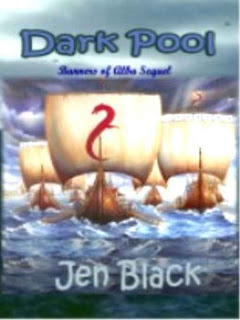Jen Black's Blog, page 111
May 30, 2012
It didn't make my heart sing
 Here's an interesting article: http://futurebook.net/content/do-editors-not-say-no-because-they-can-no-longer-say-yes
Here's an interesting article: http://futurebook.net/content/do-editors-not-say-no-because-they-can-no-longer-say-yesIt's not too long, so I'll leave it to you to click through and read the whole thing. I hope agents and editors take it to heart!
As for me, I have gone through the first three chapters of Matho 1 - now entitled The King's Business after several titles changes - checking for conflict, suspense, drama and emotional intensity. Not to mention repetition, poor grammar, awkward sentences and the occasional missed word. Yes, in spite of all the work and time spent on these three chapters over the last three years, I spotted two instances where a small, two-letter words had been omitted. (Of course, I blame the computer for that!)
So later today I shall be printing the pages out, and if I think they're up to scratch I'll think about sending them to an agent.
I'm getting more and more reluctant to send things out. There's something truly disheartening about sending these pages out, waiting six or eight weeks and receiving no reply. I mean, how much effort does it take to zip off an e-mail and say "thanks but no, it isn't what I'm looking for?" All of a minute, I'd say. That minute would be a minute well spent, because I'd certainly regard that agency as more efficient, more courteous and one I'd like to work with in the future. The agent who scrawls a hasty handwritten "it doesn't make my heart sing" across the bottom of the covering letter and returns it to me makes me give a wry grin. It's a refusal, sure, but it's personal, and she bothered to respond. Good for her.
I tend to forget about books I wrote some time ago, but they're still out there, waiting for their readers. Dark Pool is available on Kindle now, click, which it wasn't when it first came out. It's an exciting story about a young girl kidnapped by Vikings and taken to Dublin where she faces a forced marriage or the slave market. One reviewer said it was too harsh to be a romance, but as a portrayal of Dark Age life she thought it scored 100%. I know I enjoyed writing it!
Published on May 30, 2012 02:06
May 28, 2012
Plot
 I'm wrecking my first Matho story. I have a safe copy tucked away, and currently I'm going to town on the experimental copy. Chapter One has been discarded. I loved it, worked for hours on it, but no one else ever loved it as I did, so now it has gone. The scenes that made up the original chapters 2-4 are getting the treatment now.
I'm wrecking my first Matho story. I have a safe copy tucked away, and currently I'm going to town on the experimental copy. Chapter One has been discarded. I loved it, worked for hours on it, but no one else ever loved it as I did, so now it has gone. The scenes that made up the original chapters 2-4 are getting the treatment now. At least one scene has been discarded. The fragment of necessary info it contained has been transferred into another scene. I'm juggling the scenes around seeking a better story flow, and giving the protagonist Matho greater prominence. Some scenes I'm re-writing, others just need a few tweaks. In at least two places I found a basic mistake - in one instance mentioning something and then contradicting it. In the second, I realised the time sequence was so flawed my characters would be eating raw meat!
It's an interesting experience, critiquing my own work. I've read that top novelists cut and hone each scene to make sure each has all the necessary elements - pace, conflict, tension and suspense - and I thought I'd already done that, but this latest exercise is proving I was wrong. I only wish I'd realised this sooner!
Published on May 28, 2012 01:57
May 24, 2012
Millionaire's Club
 Evidently those in the know about book publishing are aware of something called the Millionaire’s Club. To join, a book has to sell more than one million copies. Joanne Harris’s novel Chocolat, which came out in 1999 has now officially passed the magic mark. Jodi Picoult’s My Sister’s Keeper (2003) is there, too. Their books are among the 68 titles that have found their way into the Club since records began in 1998. Other British female novelists to top the one million mark are J K Rowling (Harry Potter), Helen Fielding (Bridget Jones) and Kate Mosse (Labyrinth).
Evidently those in the know about book publishing are aware of something called the Millionaire’s Club. To join, a book has to sell more than one million copies. Joanne Harris’s novel Chocolat, which came out in 1999 has now officially passed the magic mark. Jodi Picoult’s My Sister’s Keeper (2003) is there, too. Their books are among the 68 titles that have found their way into the Club since records began in 1998. Other British female novelists to top the one million mark are J K Rowling (Harry Potter), Helen Fielding (Bridget Jones) and Kate Mosse (Labyrinth).
 Durham Cathedral118,000 books were published in 2011. Of those, 21,000 were adult fiction, so maybe my idea that publishers aren't publishing much in these days of recesssion is quite wrong! Only nine authors have sold more than one million copies of more than one book: Rowling (eight titles), Dan Brown (five), Stephenie Meyer (four), Stieg Larsson and Philip Pullman (both three), Julia Donaldson, Khaled Hosseini and Fielding (both two). Interestingly all of these authors have had film adaptations made of their books.
Durham Cathedral118,000 books were published in 2011. Of those, 21,000 were adult fiction, so maybe my idea that publishers aren't publishing much in these days of recesssion is quite wrong! Only nine authors have sold more than one million copies of more than one book: Rowling (eight titles), Dan Brown (five), Stephenie Meyer (four), Stieg Larsson and Philip Pullman (both three), Julia Donaldson, Khaled Hosseini and Fielding (both two). Interestingly all of these authors have had film adaptations made of their books. It is difficult to predict what will become a bestseller. Most people like a mystery and suspense turns the pages. If a book makes readers want to know "why", most people will enjoy reading it. The Millionaire’s Club authors are commercially successful, and therefore not “literary”, but they’re good writers, producing unique, imaginative works that appeals to readers.
Carl Wilkinson’s article has lots more detail and I’m sure he’s right when he claims the median annual income of a writer in Britain today is just £4,000. Most authors have other jobs so they can continue to eat, or are lucky enough to have a husband/wife who can support them while they write. Check out the entire piece: here before you decide that writing is a good way to earn money.
Published on May 24, 2012 23:05
May 23, 2012
Accepting criticism
 "Any writer who dismisses the negative but laps up the positive had better be ready for the negative reviews of her book which will come.
"Any writer who dismisses the negative but laps up the positive had better be ready for the negative reviews of her book which will come.I have had books published. Some of them have won awards. Some of the ones that have won awards have had yuckity reviews. Some of those reviews I (try to) ignore because I don't value the opinion of the giver, BUT if someone says something positive and negative, how on earth could I justify believing the good but not the bad?? If I value someone's opinion I cannot only value it when it suits me. That doesn't mean I have to kow-tow to it but it does mean I should not dismiss it out of hand as this writer seemed to, and to dismiss it so disrespectfully. For a start, the critique opinion seeks to give you the best chance of publication, about which there are no certainties."
 This morning Nicola Morgan's blog here has an interesting piece about accepting criticism even if it criticises something in your book, and commenting on the people who willfully ignore advice they don't like. I nodded my head as I read through it, because I know how difficult it can be to admit that I'm wrong and someone else is right when we're talking about my work. It took me time with a couple of critique groups to learn that there was usually a point to what critiquers were saying, even if they weren't always 100% right in their comments. (but often, they were 100% right!)
This morning Nicola Morgan's blog here has an interesting piece about accepting criticism even if it criticises something in your book, and commenting on the people who willfully ignore advice they don't like. I nodded my head as I read through it, because I know how difficult it can be to admit that I'm wrong and someone else is right when we're talking about my work. It took me time with a couple of critique groups to learn that there was usually a point to what critiquers were saying, even if they weren't always 100% right in their comments. (but often, they were 100% right!)Some people don't accept any criticism, and can be quite sharp when refuting it. Which is a shame, because if someone has taken the time to read and think about a piece of work, then their comments should at least be considered honestly. Critiquers are readers, after all, and if they are puzzled by something, then you can be sure other readers will be. There's no point in saying 'oh but that's because of x' - the critiquer doesn't have the author's detailed knowledge of the story any more than the average reader, and if he or she hasn't got it, then x hasn't come through on the page. If it hasn't, then an author should know what to do!
Published on May 23, 2012 02:17
Jen Black's Blog
- Jen Black's profile
- 6 followers
Jen Black isn't a Goodreads Author
(yet),
but they
do have a blog,
so here are some recent posts imported from
their feed.



